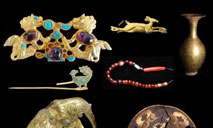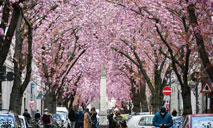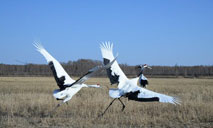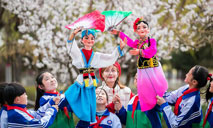Biased tone, misinformation ‘major mistakes’ by BBC on HK riot: Chinese scholar

Victor Gao (center), chair professor of Soochow University and vice president of the Center for China and Globalization, was invited to the BBC's Newsnight to debate Hong Kong secessionist Nathan Law (left) on Saturday. Screenshot from BBC News YouTube channel.
There were some major mistakes that the BBC made in its latest TV program Newsnight, including a biased tone and misinformation on the illegal protests led by radical anti-government figures who were wrongfully deemed "pro-democracy activists," a Chinese scholar who recently engaged in an online debate with Hong Kong secessionist Nathan Law told the Global Times.
Victor Gao, chair professor of Soochow University and vice president of the Center for China and Globalization, was invited to BBC's Newsnight to debate with Law, after other opposition figures such as Martin Lee Chu-ming and secessionists like Jimmy Lai Chee-ying were sentenced, which the BBC host described as 60- and- 70-something men being thrown into jail for participating in "peaceful" protests.
When the host emphasized they were "peaceful protests," the BBC got it wrong, Gao noted.
"I understand that foreign media outlets uphold their own values, for example, by claiming that the street protests are a way of exercising democratic rights. But if they still say so after the Capitol Hill riot, it's completely wrong because the nature of rioting in Hong Kong and of storming the Capitol Hill are the same," the Chinese scholar said.
As translator for former Chinese leader Deng Xiaoping, Gao is fluent in English. He laid out a number of reasons why the Western media and politicians should stop calling rioters like Law "pro-democracy activists," why the detention of people like Lai and Lee is in line with the local law in Hong Kong, and what is the truth about the anti-government protests in Hong Kong.
It was easy to see who gained the upper hand during the debate, as compared with Law - who repeatedly emphasized "peaceful protests" - Gao urged both the host and Law to open their eyes and look back at the footage the BBC shot during the citywide rampage and riots in Hong Kong in 2019.
"There was violence everywhere in the streets of Hong Kong, there was a storming of the LegCo building, there was disruption of social order in Hong Kong. If you call that peaceful demonstrations, you are losing your mind, " Gao said during the BBC show.
The Chinese scholar said he also had some messages for absconding Hong Kong secessionists like Law, but he did not have enough time to elaborate on them during the show.
"I want to tell Law that he is now living in the UK, and he should not copy what he did in Hong Kong there, as he will be put into jail if he does the same thing there," Gao told the Global Times.
While Law appeared to have no other words except "peaceful protests" in rebuking Gao's claims during the show, he said in a tweet on Sunday that the Chinese scholar "was enraged when he realized his smearing attack did not work," and he further considered it as "civility vs barbarity."
However, many netizens saw the embarrassment of Law when Gao called him what he really is - a fugitive who broke the law in Hong Kong.
A society ruled by law will hold lawbreakers accountable, which is also the principle applied in the UK, which explained why Gao wants to suggest that Law not engage in the same so-called "peaceful" protests in that country, when violent illegal assembly would always face legal consequences.
There's another major mistake the BBC made in its program by confusing different ideas, the Chinese scholar further elaborated. For example, broadcasting an interview with Lai, who claimed that under the national security law for Hong Kong, the Chinese government has been causing more "fear" and depriving him of his basic rights, which is another false statement, Gao said.
"Lai was recently sentenced for violating the public order ordinance in Hong Kong by taking part in illegal assemblies, which has nothing to do with the national security law for Hong Kong. The BBC got the facts wrong and spread this misinformation to the mainstream public," he said.
Driven by political motivation amid a deteriorating UK-China relationship, the BBC has become more biased toward China in recent years. Still, the Chinese scholar is willing to take part in such an open debate as it's important to make the public hear the other side of the story when Western understanding about the Hong Kong riots was shaped by radical anti-government rioters.
"Also, I hope the BBC could 'wake up' one day to begin adhering to its journalistic standards [on China-related reporting], instead of serving only as a government tool in containing China," he said.
Photos
Related Stories
- Commentary: U.S. interference with HK doomed to fail
- NPC decision builds security barrier for Hong Kong's long-term prosperity, stability: various sectors in Hong Kong
- China firmly opposes Japanese spokesperson's remarks on HK
- Amending electoral system ensures Hong Kong's smooth development under "one country, two systems": official
- Improving Hong Kong's electoral system constitutional, lawful and justified: Chinese envoy
Copyright © 2021 People's Daily Online. All Rights Reserved.










